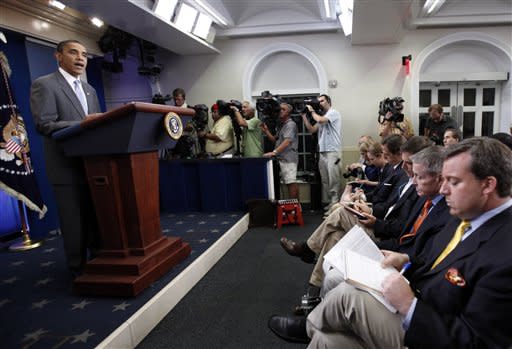 The Ticket
The TicketCongressional leaders reach agreement to raise the debt ceiling

Republican and Democratic leaders have agreed on a plan to raise the debt ceiling, President Obama announced Sunday night.
The announcement arrives after months of intense closed-door negotiations, and just two days before the deadline set by the Treasury Department.
According to the details available, the agreement would slow the growth of government spending over the next decade by $2-$3 trillion and allow enough borrowing to put off another vote to raise the ceiling until 2013. About $1 trillion in cuts will begin immediately (spread out over 10 years), and the details of the remaining spending reductions will be handled by a bipartisan committee of 12 lawmakers from both chambers, who will recommend cuts for Congress to vote on. To appease the GOP's conservative wing, the deal requires a vote in both chambers on an amendment to the Constitution requiring the federal government to balance its budget each year.
"I want to announce that the leaders of both parties, in both chambers, have reached an agreement that will reduce the deficit and avoid default--a default that would have had a devastating effect on our economy," Obama said. "Now, is this the deal I would have preferred? No ... But this compromise does make a serious down payment on the deficit reduction we need, and gives each party a strong incentive to get a balanced plan done before the end of the year."
House Speaker John Boehner held a conference call Sunday evening with House Republicans urging them to support the package, declaring that the deal "meets our principles of smaller government."
"There is a framework in place that would cut spending by a larger amount than we raise the debt limit, and cap future spending to limit the growth of government," he said, according to a transcript provided by Boehner's office. "Now listen, this isn't the greatest deal in the world. But it shows how much we've changed the terms of the debate in this town."
While the deal has the approval of leaders of the House and Senate, Congress must act quickly to convince enough members to seal the deal with a vote on Monday before Tuesday's deadline. The deal will require bipartisan support due to opposition within both parties.
Senate Minority Leader Mitch McConnell and Majority Leader Harry Reid will present the deal to their respective caucuses Monday at 11 a.m. with a vote expected after.

